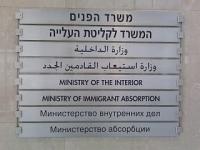Use the text of Israel's Declaration of Independence as a jumping-off point to discuss the values that form Israeli democracy and a comparison with the U.S. Declaration of Independence and its key values.

Using These Materials in Various Educational Settings
The materials in For the Sake of Justice: Understanding Israel Through Its Supreme Court can be used in a wide range of formal and informal educational settings, including school classrooms, youth groups, residential camps, retreats and more. Educators should feel free to use the materials and lesson plans as a jumping-off point for adaptation to the specific group and setting where you will use them. Teachers may want to make use of homework assignments to deepen students' understandings, while informal educators can achieve similar results by facilitating small-group and large-group discussions. Be creative - and share your ideas with us so others can benefit from them!
Israel and the U.S. take different paths to translating values into laws. Among other ways, this is seen in the different roles filled by each country's Supreme Court. While the U.S. has a constitution, Israel has a series of Basic Laws which are a key component of the country's constitutional law.
The Bar-Ilan Street Case provides an excellent opportunity to examine the complexities Israel faces as a Jewish and democratic state, and the role of Israel's Supreme Court in resolving such cases. We will compare Israel to America in order to discuss different ideas about the proper balance between religion and state.
How do Israel and the U.S. address the challenges inherent in protecting sensitive information and trying to guard against leaks of classified documents to the public realm? We will discuss whether citizens have the right to publicize such information in order to stop injustices, and how governments should protect information in this new technological era.
This module addresses the deep importance Israel places on its status as the homeland of the Jewish people, and the legal framework for encouraging Jews to settle there.
This module is designed for use after Module 5: The Law of Return. It broadens the discussion of immigration to include the different treatment afforded to non-Jews who want to live in the Jewish state.
This series of modules seeks to help participants understand that Israel’s identity as a Jewish and democratic state gives rise to complex realities in the social, civil, political, and religious spheres. By examining Israeli Supreme Court cases, we have seen how intertwined and competing strands in Jewish identity and life inform both personal and public life in Israel. In this final activity, participants will consider how their new understandings of these complexities impact their personal outlook.






